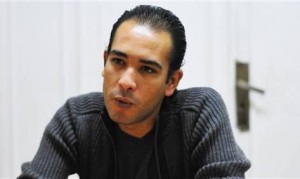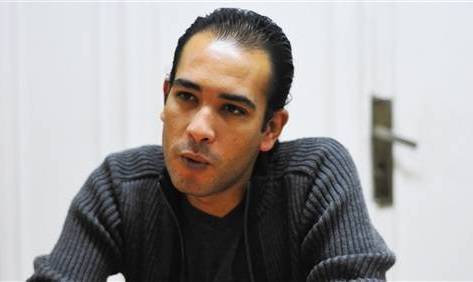 The undersigned organizations appeal to Zeid Raad, the UN high commissioner for human rights, to swiftly intervene to save the life of lawyer Malek Adly, one of the most prominent rights lawyers and human rights defenders in Egypt, who has been subjected to contemptible retaliatory measures, thought to be on direct order of senior Egyptian government officials. Adly is being punished for his tireless defense of Egyptians’ fundamental human rights and his active role in exposing human rights crimes in the media. The abuse of Adly took place as a delegation with the Office of the High Commissioner for Human Rights (OHCHR) met with several officials from the Egyptian Foreign Ministry and the governmental National Council for Human Rights. In the wake of the meeting, the delegation issued no official statement on the catastrophic state of human rights in Egypt, and it met with no independent rights groups.
The undersigned organizations appeal to Zeid Raad, the UN high commissioner for human rights, to swiftly intervene to save the life of lawyer Malek Adly, one of the most prominent rights lawyers and human rights defenders in Egypt, who has been subjected to contemptible retaliatory measures, thought to be on direct order of senior Egyptian government officials. Adly is being punished for his tireless defense of Egyptians’ fundamental human rights and his active role in exposing human rights crimes in the media. The abuse of Adly took place as a delegation with the Office of the High Commissioner for Human Rights (OHCHR) met with several officials from the Egyptian Foreign Ministry and the governmental National Council for Human Rights. In the wake of the meeting, the delegation issued no official statement on the catastrophic state of human rights in Egypt, and it met with no independent rights groups.
We strongly condemn the ongoing detention of activist and rights lawyer Malek Adly, the director of the legal unit at the Egyptian Center for Economic and Cultural Rights, and hold the president, the Interior Ministry, and the Prisons Authority wholly responsible for his physical safety. According to information from his wife and lawyers, he is being subjected to physical harm, torture, solitary confinement, and arbitrary treatment by prison authorities without legal basis and in violation of prison regulations and his rights as a suspect under investigation. The undersigned organizations consider the treatment of Adly to be a prime example of the regime’s pursuit of an alarming, unprecedented course of systematic retribution against human rights defenders and all other persons opposed to the policies of the current administration, putting their lives in danger.
The measures taken against Adly since his arrest clearly demonstrate a vindictive intent to punish him. State agencies, including the Public Prosecution, have marshaled their vague, repressive laws to this end, bringing serious charges against Adly, including infringing security, destabilizing the country, and plotting to overthrow the regime. The prosecution has also charged him with joining a group that seeks to destroy the constitution, without disclosing the name or identity of this group. According to one of his lawyers, when his defense counsel attempted to clarify the nature, activities, and members of this group, no response was forthcoming. He has also been charged with breaking the protest law, which suggests that other, more serious charges will be brought against him, carrying a sentence of at least five years in prison.
According to Adly’s wife and lawyers, and based on statements from prison administration officials, since his detention in al-Mazraa Prison, Adly has been subjected to various types of abuse. Several police personnel entered his cell while he was extremely ill and forced him to take unknown medication. He was given an injection, but did not know whether the purpose was medicinal or to take a blood sample; he lost consciousness for some time after the shot. Since his detention, he has been held in isolation in a poorly ventilated cell and denied visits. The prison authorities prohibited his wife, brother, and lawyers from seeing him on the first visit allowed by law (11 days after his detention). Prison officials also refused to admit any clothing or food to Adly, citing “orders from sovereign bodies.” He was only allowed visits and the entry of basic needs on the morning of May 19.
Going further, the Shubra Plenary Prosecution in the first remand hearing, held on Wednesday, May 18, refused to allow defense lawyers to complete their pleadings and make defense motions, telling them to file them later in a brief. The prosecution relied solely on arguments heard to that point and refused to hear Adly’s full statement, asking him to be removed from the room before the examination was complete. In response, his lawyers argued to have this conduct entered into the record and announced that they were officially withdrawing from the hearing to protest the prosecution’s actions.
The hearing ended with the extension of Adly’s detention for an additional 15 days. Adly said he was held in solitary confinement without justification and was prohibited from leaving his cell entirely. He was also not permitted to have a bed brought in to the cell at his own expense, as permitted by prison regulations. He has been denied his blood pressure medication, as a result of which he has been taken to the prison hospital four times due to high blood pressure and has repeatedly had trouble breathing. Prison officials have refused to budge, claiming they are waiting for further instructions.
Several unions around the world declared their solidarity with Adly. The Bar of England and Wales issued a statement in which it condemned the treatment of Adly and his fellow lawyers, while the Paris bar association, one of the oldest lawyers syndicates in the world, nominated Adly for its human rights defender award. Several Egyptian MPs, political parties, and public figures in Egypt also condemned Adly’s arrest and the arbitrary procedures against him.
The undersigned organizations declare their full solidarity with rights lawyer Malek Adly and hold the competent bodies fully responsible for his safety. We ask that he be released immediately and all charges be dropped, and we demand an end to the retribution against rights advocates and the harassment of human rights organizations and their staff to punish them for exposing the current regime’s violations and grave assaults on rights and liberties. We ask for the release of all persons detained in connection with exercising their right to freedom of opinion and expression and the right of peaceful assembly. The current Egyptian administration must stop its abuse and persecution every person of conscience or dissident voice.
Signatory organizations
- Cairo Institute for Human Rights Studies
- ADALAH Center for Rights & Freedoms “ACRF”
- Arab Penal Reform Organization
- Association for Freedom of Thought and Expression
- Egyptian Commission for rights and freedoms
- Masryoon Against Religious Discrimination
- Nazra for Feminist Studies
- The Egyptian Association for Community Participation Enhancement
- The Egyptian Center for Economic and Social Rights
- Appropriate Communications Techniques for Development
Share this Post

